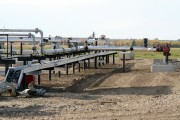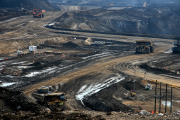Though the Trans Mountain pipeline has been a flashpoint for industry frustrated by delays and Canadians concerned about climate change, its importance to both our national climate trajectory and economic impact have been overestimated. This is not the decision that will lock in the most catastrophic climate-change effects. Nor, unfortunately, is it the long-term economic cure-all Alberta hopes for.
Alberta’s progress on introducing policies to tackle greenhouse gas pollution was an important rationale in the pipeline approval decision. But from a climate perspective this debate is actually a proxy battle for deeper issues that still need to be resolved. One is the urgent need for Canada’s oil and gas industry to embrace their responsibility to contribute to national emissions reductions. Another, perhaps thornier, issue is the ongoing struggle Canada’s economy and workers will face if we don’t address the rapidly changing global energy system that will penalize high-carbon producers.
In other words, we’re having a 20th-century debate when we need to prepare for a 21st-century low-carbon reality.
Yes, there is and will be an important role for oil in the coming decades. But the fact is that as the world strives to meet its stated objectives under the Paris climate accord, global oil demand will decline, and the race to fill ongoing global demand will be won by those who can supply product with the lowest greenhouse gas intensity.
And right now, that’s not Canada. Unfortunately, according to Stanford University research published last year, Canada’s oil is, on average, 70 per cent more greenhouse gas intensive per barrel than the global average, giving us the uncompetitive ranking of 47th out of 50 countries from a climate-performance perspective. This is the more significant threat to our industry’s long-term viability.
Our immediate priority needs to be to act quickly and decisively to remove more carbon from the barrel by strengthening industrial carbon pricing (which provides the financial incentive to innovate now), driving down methane emissions, and regulating declining emissions caps. These strong policies will succeed in making Canada’s oil and gas less GHG-intensive per barrel, making Canada more competitive, spurring innovation and attracting investment.
Strong actions to reduce the environmental impact of Canada’s oil and gas industry may also help bridge the increasingly wide divide between Canadians worried about our increasing emissions and those concerned about the jobs and benefits the industry provides. Both concerns are valid.
As the climate crisis intensifies, disproportionate focus on one pipeline decision, from a climate perspective, is distracting attention from building on the strong foundation of the Pan Canadian Framework to address greenhouse gas emissions, drive innovation and enhance competitiveness across all sectors of the Canadian economy. For the fact is, while the oil and gas industry is responsible for 27 per cent of Canada’s greenhouse gas emissions, the transportation sector is close behind at 25 per cent. We desperately need a clean fuel standard, a minimum standard across the country on sales of zero-emission vehicles, and a strategy to build these zero-emission vehicles right here in Canada.
And what is the next biggest contributor of GHG emissions after the oil and gas and transportation sectors? The buildings we live and work in account for 12 per cent of Canada’s GHG emissions. We need a national conversation about greening our building code to ensure the highest possible energy efficiency for new builds, and moving quickly to achieve deep energy retrofits to existing buildings.
Carbon pricing, now in effect across the country, will drive efficiencies in our economy, influence consumer behavior and reduce pollution at the lowest cost. An emissions cap is in place in the oilsands for the first time ever, albeit one that will need to be ratcheted down over time to drive continued oilsands decarbonization. Now it’s time for all of Canada’s leaders to broaden the climate conversation to tackle the deep emissions reductions needed across all sectors of the economy, while protecting and creating jobs for Canadians. It’s time to focus on the bigger picture.
Simon Dyer is executive director of the Pembina Institute, a non-profit think-tank that advocates for strong, effective policies to support Canada’s clean energy transition, with offices in Vancouver, Calgary, Edmonton, Toronto and Ottawa.
This opinion piece first ran in the Edmonton Journal on Aug. 23, 2019.







